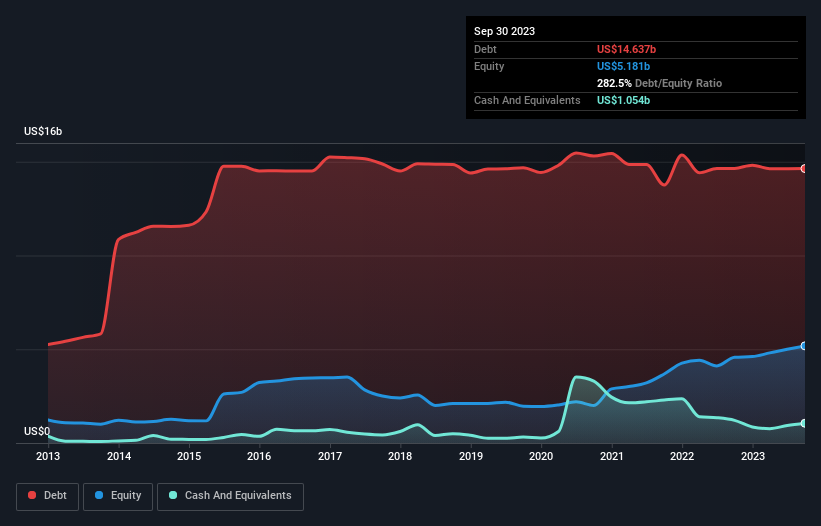- United States
- /
- Healthcare Services
- /
- NYSE:THC
We Think Tenet Healthcare (NYSE:THC) Is Taking Some Risk With Its Debt

Some say volatility, rather than debt, is the best way to think about risk as an investor, but Warren Buffett famously said that 'Volatility is far from synonymous with risk.' So it might be obvious that you need to consider debt, when you think about how risky any given stock is, because too much debt can sink a company. Importantly, Tenet Healthcare Corporation (NYSE:THC) does carry debt. But the real question is whether this debt is making the company risky.
When Is Debt A Problem?
Debt is a tool to help businesses grow, but if a business is incapable of paying off its lenders, then it exists at their mercy. If things get really bad, the lenders can take control of the business. However, a more usual (but still expensive) situation is where a company must dilute shareholders at a cheap share price simply to get debt under control. Of course, plenty of companies use debt to fund growth, without any negative consequences. The first step when considering a company's debt levels is to consider its cash and debt together.
View our latest analysis for Tenet Healthcare
What Is Tenet Healthcare's Debt?
The chart below, which you can click on for greater detail, shows that Tenet Healthcare had US$14.6b in debt in September 2023; about the same as the year before. On the flip side, it has US$1.05b in cash leading to net debt of about US$13.6b.

How Healthy Is Tenet Healthcare's Balance Sheet?
The latest balance sheet data shows that Tenet Healthcare had liabilities of US$4.43b due within a year, and liabilities of US$18.0b falling due after that. Offsetting these obligations, it had cash of US$1.05b as well as receivables valued at US$3.90b due within 12 months. So it has liabilities totalling US$17.5b more than its cash and near-term receivables, combined.
This deficit casts a shadow over the US$5.57b company, like a colossus towering over mere mortals. So we'd watch its balance sheet closely, without a doubt. After all, Tenet Healthcare would likely require a major re-capitalisation if it had to pay its creditors today.
We use two main ratios to inform us about debt levels relative to earnings. The first is net debt divided by earnings before interest, tax, depreciation, and amortization (EBITDA), while the second is how many times its earnings before interest and tax (EBIT) covers its interest expense (or its interest cover, for short). Thus we consider debt relative to earnings both with and without depreciation and amortization expenses.
Tenet Healthcare has a debt to EBITDA ratio of 3.8 and its EBIT covered its interest expense 3.0 times. Taken together this implies that, while we wouldn't want to see debt levels rise, we think it can handle its current leverage. On a slightly more positive note, Tenet Healthcare grew its EBIT at 14% over the last year, further increasing its ability to manage debt. When analysing debt levels, the balance sheet is the obvious place to start. But it is future earnings, more than anything, that will determine Tenet Healthcare's ability to maintain a healthy balance sheet going forward. So if you're focused on the future you can check out this free report showing analyst profit forecasts.
But our final consideration is also important, because a company cannot pay debt with paper profits; it needs cold hard cash. So it's worth checking how much of that EBIT is backed by free cash flow. In the last three years, Tenet Healthcare's free cash flow amounted to 33% of its EBIT, less than we'd expect. That's not great, when it comes to paying down debt.
Our View
Mulling over Tenet Healthcare's attempt at staying on top of its total liabilities, we're certainly not enthusiastic. But on the bright side, its EBIT growth rate is a good sign, and makes us more optimistic. We should also note that Healthcare industry companies like Tenet Healthcare commonly do use debt without problems. Looking at the bigger picture, it seems clear to us that Tenet Healthcare's use of debt is creating risks for the company. If everything goes well that may pay off but the downside of this debt is a greater risk of permanent losses. There's no doubt that we learn most about debt from the balance sheet. However, not all investment risk resides within the balance sheet - far from it. For example, we've discovered 2 warning signs for Tenet Healthcare (1 is concerning!) that you should be aware of before investing here.
When all is said and done, sometimes its easier to focus on companies that don't even need debt. Readers can access a list of growth stocks with zero net debt 100% free, right now.
Valuation is complex, but we're here to simplify it.
Discover if Tenet Healthcare might be undervalued or overvalued with our detailed analysis, featuring fair value estimates, potential risks, dividends, insider trades, and its financial condition.
Access Free AnalysisHave feedback on this article? Concerned about the content? Get in touch with us directly. Alternatively, email editorial-team (at) simplywallst.com.
This article by Simply Wall St is general in nature. We provide commentary based on historical data and analyst forecasts only using an unbiased methodology and our articles are not intended to be financial advice. It does not constitute a recommendation to buy or sell any stock, and does not take account of your objectives, or your financial situation. We aim to bring you long-term focused analysis driven by fundamental data. Note that our analysis may not factor in the latest price-sensitive company announcements or qualitative material. Simply Wall St has no position in any stocks mentioned.
About NYSE:THC
Tenet Healthcare
Operates as a diversified healthcare services company in the United States.
Very undervalued with proven track record.


